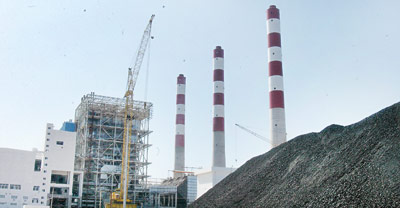News
CEB TUs on the warpath against Govt. plans to ‘outsource’ Lakvijaya
Ceylon Electricity Board (CEB) trade unions are gearing for battle over Government plans to establish a “special purpose vehicle” (SPV) or subsidiary company to run the Lakvijaya coal power plant in Norochcholai.

The Lakvijaya coal power plant in Norochcholai
Finance Minister Ravi Karunanayake said in his Budget speech that he proposes to establish an SPV for Lakvijaya to be securitised. “I emphasise that the ownership structure of the power plant will not change, but the CEB’s liquidity position will improve and thus enable its expansion activities,” he held.
But unions fear the move is a precursor to relinquishing control of Lakvijaya to its Chinese builders. The CEB already has an operations and maintenance agreement with China Machinery Engineering Corporation (CMEC). Separately, due to a shortage of technical officers, the CEB has hired Chinese staff from CMEC to run the third coal power unit at Lakvijaya.
Now CEB unions are worried that the cash-strapped Government, unable to meet loan repayments, will hand Lakvijaya over to CMEC.
Thirty-four major unions signed a letter of protest this week and called for a meeting with the Minister of Power and Renewable Energy Ranjith Siyambalapitiya and ministry officials.
CEB Engineers’ Union (CEBEU) President, Athula Wanniarachchi, did not mince his words. “If the proposed SPV is a subsidiary established under the Companies Act, there are no provisions in the law to prevent change of ownership structure or sale of it to a Chinese or any other party,” he observed.
In a missive to Minister Siyambalapitiya, the CEBEU says: “We wish to bring to your attention that it is very dangerous to take decisions on power sector infrastructure based solely on finances and economics without understanding the role such infrastructure play in the overall power system and without paying attention to complications that would bring, such as operational and energy security”
The letter said they would be “compelled to take appropriate trade union actions if ad hoc and hasty decisions are taken without having a proper dialogue with the stakeholders in the power sector including the trade unions”.
CEB General Manager M.C. Wickramasekara said the utility had not been informed about the plans for Lakvijaya. Secretary to the Minister of Power and Energy, Dr B.B.S Batagoda, implied that the unions were misguided in believing the Lakvijaya plant would be transferred to a third party, Chinese or otherwise. There will be a meeting between the ministry and employee representatives tomorrow.
Dr Batagoda acknowledged that the workers questioned the Government’s motives. But he said the CEB had other subsidiaries such as Lanka Coal Company (Pvt) Ltd, Lanka Electricity Company (Pvt) Ltd, LTL Holdings (Pvt) Ltd and West Coast Power (Pvt) Ltd. He said the original objective had always been to run Lakvijaya separately as it was a very big plant.
“That is why we set up Lanka Coal Company, as a precursor to running the plant independently,” he said. “But the CEB unions opposed it so it didn’t go through. So we retained Lanka Coal Company and instructed it to import the coal for the plant.”
The idea is to improve management of the plant, Dr Batagoda said. “We will not give it,” he maintained. “If the unions are worried, they can take a golden share in the company that is to be set up. This would ensure that nothing goes through without their vote.”
In their letter to Minister Siyambalapitiya, the CEBEU observed “a clear lack of discussion” on power sector policies and strategies in formulating the 2016 Budget proposals. The increase in taxes on electric vehicles disregarded the broader, long term objective of experts to reduce liquid petroleum dependency in the transport sector.
The business models proposed for the Mannar wind farm were impractical and incompatible with the CEB’s wind power operating strategy.
Mr. Wanniarachchi pointed out that the purpose of establishing a separate company for Lakvijaya is reportedly to improve the liquidity position of the CEB.
“However, the possibility of improving the CEB’s liquidity position by just transferring a loan component to a subsidiary company is not clear,” he said.
Dr. Tilak Siyambalapitya, a power sector expert, agreed. “CEB’s liquidity position cannot be improved by such book transfers, because from the very next month the CEB will have to pay the SPV a capacity charge that is equal to the loan repayment (capital and interest), maintenance, some kind of markup or return on equity, and some salaries of newly-appointed Chairpersons and Directors of the new SPV!” he said.
The CEBEU has pointed out that the term SPV is not clearly defined. Dr Siyambalapitiya says the Budget speech is full of undefined acronyms, language errors and wrong technical terms.
It also “displayed a lack of insight into certain technical and economic realities”. However, Dr Siyambalapitiya also says that, if managed well, SPVs can be a good method of attracting investments to the power sector, because the CEB balance sheet is in the red as a result of the Government not paying the promised subsidies.

